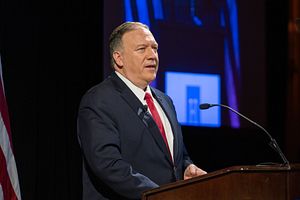 On January 1, the U.S. State Department announced that Secretary Mike Pompeo’s upcoming trip to Eastern Europe and Central Asia would be postponed.
On January 1, the U.S. State Department announced that Secretary Mike Pompeo’s upcoming trip to Eastern Europe and Central Asia would be postponed.
The postponement, which came just two days after State officials previewed the trip for the press, was in response to a spike in tensions in the Middle East.
The announcement noted that the trip, originally scheduled for January 3-7, has to be postponed “due to the need for the Secretary to be in Washington, D.C., to continue monitoring the ongoing situation in Iraq and ensure the safety and security of Americans in the Middle East.”
It’s a most unsurprising turn: U.S. foreign policy engagements elsewhere in the world truncated because of trouble in the Middle East.
On Tuesday, violent protests that had been ongoing in Baghdad shifted attention from the Iraqi government to the United States. NPR has a good summary of the turn of events:
U.S. officials have said that for months Iraqi militias — backed by Iran — have been firing rockets at Iraqi military bases where some U.S. troops and American contractors are also stationed. Last Friday, a rocket attack killed a U.S. contractor in northern Iraq. The U.S. responded with airstrikes on five compounds in Syria and Iraq belonging to a group it blames for the rocket attack, the Iranian-backed militia called Kataib Hezbollah, meaning Hezbollah Brigades. The militia says at least 25 of its fighters died.
After funeral processions Tuesday in Baghdad, militia members and their supporters marched into central Baghdad and the fortified Green Zone, straight to the U.S. Embassy. Iraqi security looked on, but did not intervene initially.
The militia members, who were not armed, didn’t breach the high walls and barbed wire of what is one of the world’s most heavily protected embassies. But they battered their way into a large guardhouse gate building and set it on fire. They also burned a second, small guard post. U.S. Embassy security responded with tear gas and stun grenades.
The Defense Department subsequently deployed a Marine unit based in Kuwait that had been created specifically in the wake of Benghazi to rapidly respond to U.S. embassies in distress. An infantry battalion from the Immediate Response Force (IRF) of the 82nd Airborne Division was also deployed to the area.
While President Donald Trump retweeted praise for his decisions, media framed the issue within the context of Benghazi. A former senior official told POLITICO that Pompeo, in particular, “has long dreaded having a Benghazi-type event on his watch and would be horrified if Americans died in a similar event, in part because of his criticism of Hillary Clinton during Benghazi.”
The Trump administration’s escalating conflict with Iran distracts from its other foreign policy priorities. The visit to Ukraine was set to be the highest-level visit amid the Trump impeachment proceedings, in which Kyiv has a central role. The full arc of the trip was to serve as a boost to U.S. interests in Russia’s periphery, as an attempt to gin up support against China, and, in Uzbekistan, further discuss the Afghan peace process. All these issues still matter.
According to the State Department, Pompeo’s trip will be rescheduled “in the near future.”
No comments:
Post a Comment